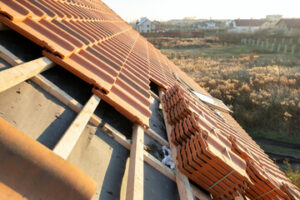Addressing a roof’s issues upfront will save you big bucks in the future. A roof replacement can also improve your home’s curb appeal.

Take accurate field measurements. Frame your home with a top view in Google Earth and use a tape measure to get length and width for each plane on your roof, including dormers. To learn more, visit https://www.corpuschristiroofingco.com/.
The pounding of hammers and impact from nail guns will create a lot of vibrations throughout the house. It can make hanging pictures and other decorations shake and potentially fall down, so it’s a good idea to remove them before the roofers arrive. The same goes for any knick-knacks or delicate mementos that are stored in the attic; they should be moved to a safer place before work begins.
It’s also a good idea to have children and pets stay elsewhere for the duration of the project. This can keep them calm and safe and it will ensure that they aren’t in the way while the roofing team works on your home. Having kids stay at Grandma’s or another family member’s home is one option, and you can take the dog to a friend for the day.
Outside the house, it’s a good idea to move cars out of the driveway to allow the roofing crew to get in and out easily. There may be a lot of dust and debris, so it’s also wise to close up windows. If you have a garden with delicate plants, it’s a good idea to cover them with tarps or put them in a garage or shed where they can be safe. If you have a pond or water feature in the yard, it’s also a good idea to mark it so that roofers don’t accidentally step into it.
Having the right equipment is key to a successful roofing installation. A hammer, gloves, and a nail gun are all needed to complete the job, but there are some other things you should consider buying ahead of time.
A caulking gun and roofing caulk are essential for the job because they will be used to seal any raw edges on the underlayment and new shingles. A pry bar and screwdriver are also useful tools for getting stuck or stubborn material loose before it can be nailed down. A small toolbox is also a good idea for keeping all the tools you’ll need together and organized; it will make the process much faster and easier.
Inspection
In many workplaces, a supervisor or worker conducts ongoing inspections of the work environment and equipment. During this time, the inspector can identify any unusual or hazardous operating conditions that could cause injury to workers or damage property. He or she may then generate a hazard report to address the issue immediately. In some workplaces, these inspections are part of a formal health and safety committee’s job description. In others, the workers themselves may submit these reports.
The roofing crew will also check the roof decking and underlayment for any water damage or structural issues that need to be addressed before installing the new shingles. The roofer will also inspect and replace any vents, such as those for sewer ventilation or curve vents that ventilate bathrooms or kitchen ranges. In addition, the roofer will check and repair any mastic around vents. He or she will also inspect the gutters for any loose or broken pieces that need to be replaced.
During the inspection, the crew will ensure that all roofing materials meet local codes and regulations for your area and homeowners association. They will also check that the shingle color and style meets your requirements. Once the roof has been inspected, the roofing crew will clean up all debris and make sure there are no stray nails left behind. Then, a final inspection will be conducted to ensure that everything is up to code and looks good.
When performing an inspection, it is important to have the right tools for the job. Having the right equipment makes the process easier and safer. A few important tools to have include: a nail gun, gloves, a hammer, and a caulk gun. You’ll also need a small pry bar or screwdriver to remove any stuck material that won’t budge. Additionally, you’ll need a pencil and a notepad to document your findings. It is recommended to discuss the planned inspection route before starting. This will eliminate any confusion about where the team is going and what they’re looking for. It’s also a good idea to “huddle” before entering noisy areas so that team members can communicate without shouting or using hand signals.
Installation
Re-roofing requires a lot of labor and is not for those who are afraid of heights or lack construction experience. Roofing contractors use standard roofing tools, including hammers and nail guns, ladders, shingles cutters, hard hats, and harnesses. They also use roofing caulk to seal raw edges.
Roof ventilation is an essential part of any roof, preventing moisture damage to the attic and insulation and regulating interior temperatures. Soffit vents, gable vents, and ridge vents are common options. Roof edgings, hip and ridge caps are also available to protect the hips and ridges of your new roof. They are made of the same material as the shingles and add a finished look to your roof.
Maintenance
When your roofing installation is complete, you’ll need to perform a few maintenance tasks to keep your new roof in great shape. This includes regular inspections and routine cleaning of large accessories such as chimneys, skylights and vent outlets. Keeping these areas clean can prevent leaks and water damage that can occur over time. It’s also a good idea to regularly check for and repair damaged flashing and underlayment. Also, be sure to remove or pound flat protruding nails that can tear holes in the new underlayment and shingles. Finally, make sure you have large tarps to cover plants and other movable objects near the house during roof repairs. This will protect them from falling shingle debris. You’ll also want a caulk gun and roofing caulk to seal raw edges.
